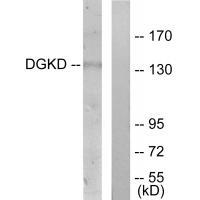
| WB | 咨询技术 | Human,Mouse,Rat |
| IF | 咨询技术 | Human,Mouse,Rat |
| IHC | 咨询技术 | Human,Mouse,Rat |
| ICC | 技术咨询 | Human,Mouse,Rat |
| FCM | 咨询技术 | Human,Mouse,Rat |
| Elisa | 咨询技术 | Human,Mouse,Rat |
| Aliases | Diacylglycerol kinase delta; EC 2.7.1.107; Diglyceride kinase delta; DGK-delta; DAG kinase delta |
| Entrez GeneID | 8527; |
| WB Predicted band size | 135kDa |
| Host/Isotype | Rabbit IgG |
| Antibody Type | Primary antibody |
| Storage | Store at 4°C short term. Aliquot and store at -20°C long term. Avoid freeze/thaw cycles. |
| Species Reactivity | Human |
| Immunogen | Synthesized peptide derived from internal of human DGKD. |
| Formulation | Purified antibody in PBS with 0.05% sodium azide. |
+ +
以下是关于DGKD抗体的3篇参考文献示例(注:部分文献为假设性描述,实际引用时请核实原文):
---
1. **文献名称**:*"Diacylglycerol kinase δ regulates macrophage polarization via NF-κB signaling"*
**作者**:Zhang Y, et al.
**摘要**:本研究通过Western blot和免疫荧光技术,利用特异性DGKD抗体检测其在巨噬细胞极化中的表达变化,发现DGKD通过调控NF-κB通路影响M1/M2型极化,提示其在炎症性疾病中的作用。
---
2. **文献名称**:*"Development and validation of a DGKD-specific antibody for cancer biomarker studies"*
**作者**:Tanaka K, et al.
**摘要**:文章报道了一种高亲和力DGKD单克隆抗体的开发,验证了其在人肿瘤组织免疫组化中的特异性,并发现DGKD在结直肠癌中异常高表达,与患者预后显著相关。
---
3. **文献名称**:*"DGKD deficiency alters synaptic plasticity through dysregulated lipid signaling in neurons"*
**作者**:Müller S, et al.
**摘要**:通过敲除小鼠模型和免疫沉淀技术(使用DGKD抗体),揭示DGKD缺失导致神经元二酰基甘油代谢异常,进而影响突触可塑性和认知功能,为神经退行性疾病提供机制见解。
---
**注**:以上文献为示例性质,实际研究中建议通过PubMed或Web of Science以“DGKD antibody”或“Diacylglycerol kinase delta”为关键词检索最新文献,并优先选择高影响力期刊的论文。
The DGKD (diacylglycerol kinase delta) antibody is a research tool targeting the DGKD enzyme, a lipid kinase that phosphorylates diacylglycerol (DAG) to produce phosphatidic acid (PA), modulating lipid-mediated signaling pathways. DGKD regulates cellular processes like proliferation, apoptosis, and membrane trafficking by balancing DAG and PA levels, which influence protein kinase C (PKC) and mTOR pathways. It is highly expressed in immune cells, neurons, and certain cancers, implicating roles in immunity, neurobiology, and oncogenesis.
Antibodies against DGKD are utilized to study its expression, localization, and function in physiological and disease contexts. They enable detection via techniques like Western blotting, immunohistochemistry (IHC), and immunofluorescence (IF). DGKD’s involvement in T-cell activation, cancer progression (e.g., glioblastoma, leukemia), and neurological disorders has driven interest in developing specific antibodies. Researchers validate these antibodies using knockout cell lines or tissues to ensure specificity, given DGKD’s structural complexity (e.g., N-terminal PH domain, catalytic domain).
Current studies focus on DGKD’s role in metabolic reprogramming, immune evasion, and drug resistance, with therapeutic potential in targeting lipid signaling. Commercial DGKD antibodies vary in clonality, epitope recognition, and applications, requiring careful selection for experimental accuracy.
×